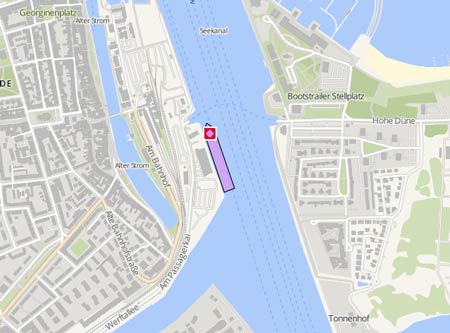AGNI
Kurs/Position
Die letzten Häfen
Die letzten Wegpunkte
Die neuesten Nachrichten
DSD Shipping Sentenced to Pay $2.5 Million Over Illegal Discharges
Norwegian shipping company DSD Shipping has been sentenced to pay a total penalty of $2.5 million as a result of its convictions in Mobile, Alabama, for obstructing justice, violating the Act to Prevent Pollution from Ships (APPS), tampering with witnesses and conspiring to commit these offenses. The company was ordered to pay $500,000 of the penalty to the Dauphin Island Sea Lab Foundation to fund marine research and enhance coastal habitats in the Gulf of Mexico and Mobile Bay. DSD has also been placed on a three year term of probation and was ordered to implement an environmental compliance plan to ensure the company’s vessels obeyed domestic and international environmental regulations in the future. Evidence presented at trial established that DSD operated the 56,000 gross ton crude oil Stavanger Blossom from 2010 to 2014 without an operable oily-water separator as required by law. On January 29, 2010, an internal corporate memorandum written by a vessel engineer warned DSD that the pollution prevention equipment did not work. The memo further warned that if the problem was not addressed, “some day, it might end up that someone is getting caught for polluting.” https://gcaptain.com/dsd-shipping-sentenced-to-pay-2-5-million-over-illegal-discharges/
DSD Shipping found guilty of dumping waste in the Gulf of Mexico
Norwegian shipping line DSD Shipping – full name Det Stavangerske Dampskibsselskab AS – and three of the company’s employees were convicted in a US court of dumping waste oil and contaminated waste water in the Gulf of Mexico in early 2010. A federal court in Mobil, Alabama, found the parties in violation of the Act to Prevent Pollution from Ships for knowingly using an inoperable oily-water separator (equipment which, when working properly, prevents the discharge of waste materials) on board the vessel Stavanger Blossom. They also failed to log the discharge in an oil record book as required. http://splash247.com/dsd-shipping-found-guilty-of-dumping-waste-in-the-gulf-of-mexico/
Court finds U.S. jurisdiction over foreign vessel
In a decision issued on September 15, 2015, the U.S. District Court for the Southern District of Alabama followed precedents from a number of courts that hold that the U.S. has criminal jurisdiction over violations of the Act for the Prevention of Pollution from Ships, even though the underlying actions – allegedly wrongful discharges of oily wastes and plastics and false entries in records books – were committed on the high seas. United States courts continue to uphold prosecutions of non-U.S.-flag vessels for pollution incidents beyond U.S. waters when the pollution is covered up with false records presented to U.S. officials.In a decision issued on September 15, 2015, the U.S. District Court for the Southern District of Alabama followed precedents from a number of courts that hold that the U.S. has criminal jurisdiction over violations of the Act for the Prevention of Pollution from Ships, even though the underlying actions – allegedly wrongful discharges of oily wastes and plastics and false entries in records books – were committed on the high seas.DSD Shipping A.S. and certain of its crewmembers from DSD’s tank vessel STAVANGER BLOSSOM are facing charges in federal court in Mobile, Alabama, for criminal violations of the U.S. Act for the Prevention of Pollution from Ships. The charges stem from the alleged wrongful discharge of oil-contaminated bilge water and plastic bags at sea and the failure of the ship’s crew to document those discharges in the vessel’s Oil Record Book and Garbage Record Book. Unlike the vast majority of defendants in similar cases, the company and crewmembers here have decided to fight the charges in court rather than accept a plea agreement. With trial currently set for October 2015, the defendants argued that the U.S. lacks jurisdiction to charge them for alleged violations of maritime pollution regulations occurring outside of U.S. waters on a foreign flag vessel. However, the court disagreed, noting that the charged offenses are based on the entry of the vessel into U.S. waters with a knowingly inaccurate oil record book and not on the conduct on the high seas. The court pointed out that the charges are not for the pollution or even the making of false entries, but rather for the misrepresentation in U.S. ports resulting from bringing the false record book into the U.S. The court then went even further, ruling that even if the offenses were the making of the false entries on the high seas, the APPS prohibitions against that conduct apply extraterritorially, because the harm protected against – the misleading of Coast Guard investigators – effects matters in the U.S. and the crimes do not depend on where they are committed.In its ruling, the court also held that separate charges for bringing the same false oil record book into different ports was not an improper multiplication of the charges. The defendants had been charged with similar offenses for bringing the allegedly false record books into Mobile, Alabama, and into Lake Charles, Louisiana. In their pre-trial motion, the defendants argued that the charges violated the Constitutional prohibition against double jeopardy by charging them with multiple criminal counts for the same alleged misconduct. However, the court pointed out that the offenses were not the alleged pollution itself or the making of the allegedly false oil record book entry, but separate incidents of bringing inaccurate books into multiple U.S. ports. Source: Winston & Strawn
News schreiben

